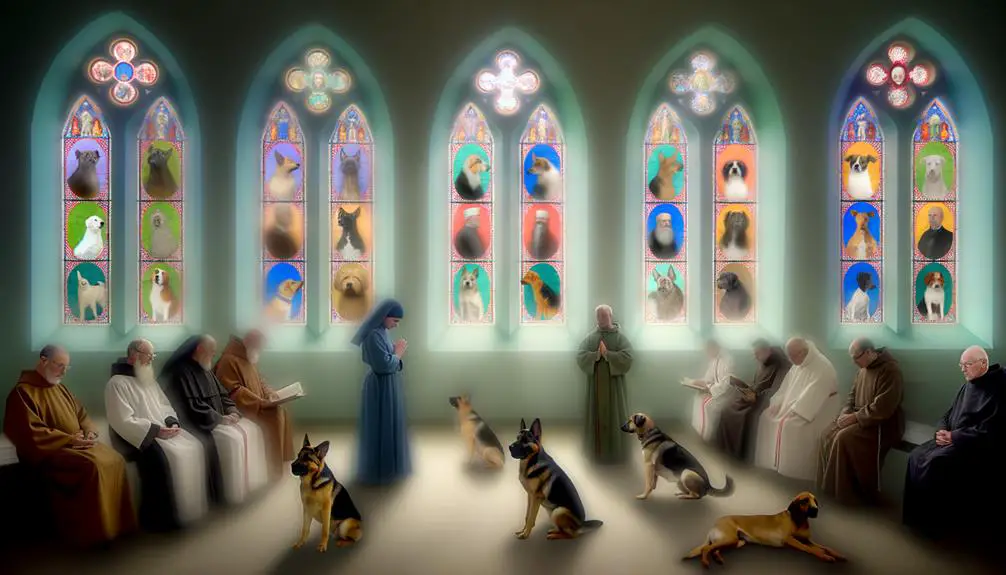Learn if dogs have souls according to the Bible and discover the spiritual significance attributed to all creatures in scripture.

Do Dogs Have Souls in the Bible
The Bible doesn't explicitly state that dogs have souls similar to humans, yet it imbues all of creation, including animals, with intrinsic value and purpose. You'll see that scripture distinguishes between human souls, endowed with moral responsibilities and eternal destinies, and animal souls, which are perceived as less complex. However, both are part of God's creation, deserving respect and compassionate care. The inclusion of animals in sacred contexts and Jesus' compassionate references to them in parables imply a significant, though different, spiritual essence. Exploring these scriptural nuances offers deeper insight into the spiritual significance attributed to all creatures.
Key Takeaways
- The Bible does not explicitly state that dogs or other animals have souls like humans.
- Biblical texts focus more on human spiritual responsibilities and afterlife.
- Animals, including dogs, are portrayed with respect and as part of God's creation.
- Theological interpretations vary, with some views suggesting animals have a unique spiritual essence.
- Scripture emphasizes stewardship and compassionate care for all creatures, reflecting their intrinsic value.
Biblical View of Animals

The Bible portrays animals as part of God's creation, entrusted to human care and deserving of respect and compassion. This notion extends from the Genesis narrative where humans are mandated to 'rule over the fish of the sea and the birds of the air and over every living creature that moves on the ground' (Genesis 1:28). This ruling isn't about domination but stewardship—a careful management and conservation of resources, reflecting God's love and respect for His creation.
In the biblical context, animal stewardship is an integral part of Creation care, suggesting a divine expectation for humans to act as protectors and nurturers of the animal kingdom. Proverbs 12:10 illustrates this, stating, 'A righteous man cares for the needs of his animal.' This implies that moral rectitude in humans is measured, in part, by their treatment of animals.
This stewardship also involves a recognition of the intrinsic value of animals as part of God's diverse and interdependent creation. It's about maintaining the balance and harmony of God's world, underscoring a symbiotic relationship between humans and animals. Therefore, your role isn't merely utilitarian but deeply spiritual, fostering a compassionate coexistence that mirrors divine intention.
Souls: Human Vs Animal
Exploring the distinction between human and animal souls reveals deep theological nuances and significant implications for our understanding of life and afterlife. As you investigate these waters, you'll find that the debate hinges on spiritual consciousness and the ethical treatment of living beings.
The concept of a soul traditionally encompasses notions of an eternal, spiritual essence. In humans, this is often linked with moral judgment, rationality, and an eternal relationship with the divine. Animals, on the other hand, are sometimes viewed as having a more limited form of spiritual consciousness, affecting how we consider their treatment and afterlife prospects.
Here's a breakdown to help clarify these concepts:
Aspect |
Human Souls |
Animal Souls |
|---|---|---|
Spiritual Consciousness |
Advanced, capable of complex understanding and ethical reasoning |
Present, but often perceived as less complex |
Ethical Significance |
Souls bear moral responsibilities and are subject to divine judgment |
Treatment of animals reflects human ethical standards |
Afterlife Connection |
Often viewed as eternal, with potential for salvation or damnation |
Less clear; some traditions suggest a form of spiritual continuation |
Biblical References |
Extensively discussed in various scriptures |
Less frequently addressed, often indirect |
Keep in mind, the depth of spiritual consciousness in animals is still a topic of much debate and spiritual exploration. How we interpret these differences shapes our actions and attitudes toward all creatures, urging a reconsideration of the ethical treatment across all forms of life.
Old Testament Insights

Delving into the Old Scriptures, you'll find nuanced perspectives on the nature of animal souls compared to human ones, reflecting a complex theological landscape. It's evident that animals hold a significant place within the biblical text, both in practical terms and in the broader cosmological framework. You'll notice that the use of animal sacrifices, as prescribed in Leviticus, serves not merely as ritual practice but as a profound declaration of the relational dynamics between humanity, divinity, and the animal kingdom. These sacrifices underscore a theological assertion that animals, while distinct from humans in spiritual capacity, are integral to the sacred transactions between man and God.
Further exploration reveals that animals' creation roles are not merely incidental. Genesis describes animals as filling the earth and having God-given purposes, suggesting a divine intentionality in their existence. This placement implies that while animals may not possess souls akin to humans, they are nonetheless part of God's good creation, deserving of respect and care. This idea challenges you to contemplate the broader implications of how you view and treat animals within a theological context, inviting a deeper reverence for life in all its forms.
New Testament Perspectives
As you explore the New Scripture perspectives on whether dogs have souls, consider the role of animals in Jesus' parables. Reflect on whether salvation, as discussed in these texts, is exclusively a human concern. Analyze how different scriptural interpretations might support or refute the idea of animal souls within this context.
Jesus and Animal Parables
In the New Covenant, Jesus' use of animals in parables serves as a profound method to elucidate spiritual truths, reflecting a compassionate recognition of their roles in human life. You can see this through:
- The Good Shepherd (John 10:11-18): Jesus describes Himself as a shepherd who lays down His life for the sheep, illustrating His sacrificial love and demonstrating deep animal empathy.
- The Lost Sheep (Luke 15:3-7): This parable symbolizes God's pursuit of sinners, paralleling a shepherd's care and concern for his flock.
- The Unmerciful Servant (Matthew 18:23-34): Though indirectly, animals here symbolize value and responsibility, akin to how humans are valued by God.
- The Mustard Seed (Matthew 13:31-32): It highlights growth from small beginnings, using birds nesting in branches as symbols of nurturing and protection.
Salvation: Human Exclusive?
Does the New Covenant suggest that salvation is exclusively available to humans, or might it extend to all of God's creation, including animals? You're faced with a profound question that explores deeply into the essence of Divine Grace and the scope of what Christ's redemption covers. The New Scripture, while primarily focused on human salvation through faith and repentance, does not explicitly limit the reach of Christ's sacrificial act. This suggests a broader, more inclusive application of Divine Grace that could hint at a role for all creatures within the framework of Eternal Destiny. Consider the inclusivity of God's love and grace—could it not encompass all He has created? This perspective challenges us to rethink traditional views on salvation and the full extent of God's redemptive plan.
Souls: Scriptural Interpretations
Exploring the New Scriptures, we find varied interpretations regarding the existence of souls, each shedding light on the spiritual dimensions recognized by early Christian thinkers. The concept of the soul's nature and its eternal destiny is intricately woven through the texts, suggesting a profound understanding of spiritual essence and eternal consciousness. To appreciate these layers, consider the following perspectives:
- Matthew 10:28 – Fear not those who kill the body but cannot kill the soul, highlighting the soul's immortality.
- Luke 23:43 – Today you will be with me in paradise, implying the soul's awareness beyond physical death.
- 2 Corinthians 5:1 – A promise of an eternal house in heaven, symbolizing the soul's everlasting nature.
- Revelation 6:9-11 – Souls of martyrs depicted as sentient, aware, and awaiting justice, underpinning the soul's continued consciousness.
These passages collectively illuminate the New Scriptures rich tapestry of insights into the soul's eternal journey.
Theological Interpretations
Theologians often debate whether scripture implies that dogs, like humans, possess souls. You might find yourself pondering the divine essence attributed to all of God's creatures and the spiritual significance this holds. Some theologians argue that the presence of a soul is intricately linked with the capacity for relationship with the Divine. They suggest that if dogs exhibit emotions and relationships, albeit different from human ones, this could hint at a type of soul, distinct yet valued by God.
In your exploration, you'll notice that scripture does not explicitly assign a soul to animals in the same way it does to humans. However, the reverent treatment of all creation suggests a form of respect that transcends mere physical existence. This respect might be seen as acknowledging a deeper, though perhaps different, spiritual essence in animals. This perspective invites you to not only what makes humans unique but also the broader tapestry of life that includes animals.
Thus, the question of whether dogs have souls becomes less about equivalence to human souls and more about recognizing the unique way they reflect God's creation. This reflection might not mirror the human soul but still holds significant value in the theological narrative.
Christian Denominations' Views

While some theologians speculate on the soulful nature of dogs, various Christian denominations have developed distinct perspectives on this issue. Their views reflect broader theological principles, such as the interpretation of scripture and the role of animals in God's creation. Here's how four major denominations generally approach the concept of animal souls and, specifically, those of dogs:
- Catholicism: The Catholic Church doesn't officially recognize animals as having immortal souls, but it emphasizes animal empathy and the ethical treatment of all God's creatures. Pope Francis, for instance, has highlighted the importance of Creation stewardship, suggesting that animals have a purpose and value beyond human utility.
- Orthodoxy: Similar to Catholicism, the Orthodox Church teaches that animals are part of God's creation deserving respect and kindness. However, it generally holds that only humans have immortal souls, placing more emphasis on human responsibility towards animals as part of creation stewardship.
- Protestantism: Views among Protestant denominations can vary widely, but many align with the belief that animals do not have souls in the same way humans do. Nonetheless, there's a strong focus on humane treatment driven by the Biblical mandate to steward creation.
- Anglicanism: The Anglican Communion often discusses the welfare and rights of animals within the context of Christian duty and compassion. While not definitively stating that animals have souls, there's a significant advocacy for animal empathy within its teachings.
These nuanced views guide how adherents interact with and perceive animals, reflecting a deep engagement with ethical and spiritual questions about the natural world.
Implications for Pet Owners
For pet owners, understanding the theological views on whether dogs have souls influences how they ethically care for and perceive their animals. If you believe that your dog possesses a soul, you're likely to approach its care with a heightened sense of moral responsibility. This belief can deeply affect how you respond to pet grief and seek emotional support during the loss of a pet. Recognizing a spiritual aspect in dogs may lead you to treat them not merely as property but as companions with intrinsic value and rights.
The view of dogs as soulful beings can also enrich the bond between you and your pet, providing a profound source of emotional support. When you perceive your dog as having a soul, you may find greater comfort and solace in their presence, particularly during challenging times. This perception fosters a deeper empathy towards the emotional states of your dog, encouraging you to respond more attentively to their needs.
As a result, the belief in the soulful nature of dogs not only shapes ethical pet ownership but also enhances the mutual emotional support within the relationship. It's important, consequently, to reflect on these spiritual dimensions as they profoundly impact the care and affection shared between you and your pet.
Frequently Asked Questions
How Do Children's Views on Animal Souls Differ From Adults?
You'll find that children, with their heightened sense of animal empathy and perception of innocence, often believe more strongly than adults that animals possess souls, reflecting a more inclusive and compassionate worldview.
Are There Specific Prayers for Pets Who Have Passed Away?
Yes, there are specific prayers for pets who have passed away, often found within pet memorials and grieving rituals. These provide comfort and acknowledge the deep bond you shared with your beloved pet.
Do Pets Visit Us in Dreams According to the Bible?
The Bible doesn't specifically mention pets visiting us in dreams, but dream symbolism and spiritual encounters could suggest personal interpretations of such experiences, holding unique meaning for you in your spiritual journey.
What Do Biblical Scholars Say About Animals in Heaven?
Biblical scholars often view animals in heaven through the lens of symbolism and scriptural interpretations. They debate animal resurrection's theological implications, pondering if such narratives reflect broader spiritual truths in a reverent analysis.
How Can Pet Owners Cope Spiritually With the Loss of a Pet?
To cope spiritually with the loss of a pet, consider creating pet memorials or seeking spiritual counseling. These steps can provide solace and honor your pet's memory in a meaningful, reverent way.



Sign up